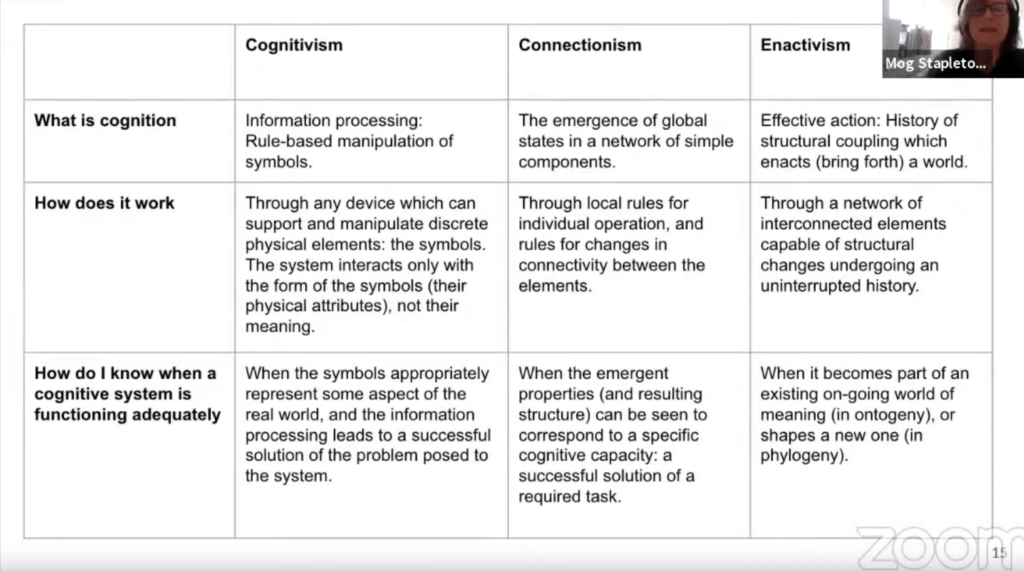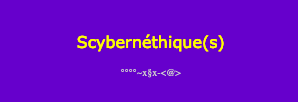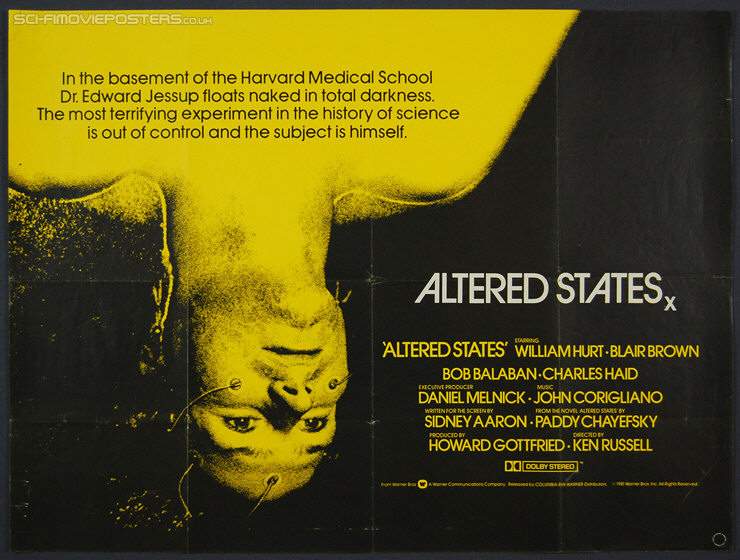°°°°~x§x-<@>
Ongoing Project: KI-LIFE² (03/2023)
KI-LIFE² – the Knowing Intelligence – Learning Interactively For Everybody and Enlivenment.
My answer to the current AI disruption is to try to launch a project for designing a “Learning Assistant using AI, Machine Learning and Data Science for enhancing personal and collective cognition toward future² ‘Knowing societies’ and enlivening the planet.”
>>> You can read my proposal (grant accepted) here.
>>> If you are interested and want to help, join our KI-LIFE² community platform!

About this presentation
“Scybernethic(s): existential enaction, creative cognition and technological hermeneutics toward a second-order rationality” has been elaborate with the objective to be published in a traditional journal historically linked to second-order cybernetics and enaction (Constructivist Foundations), read by many knowledgeable people in the enactive community. But after an initial reviewing, and in regard to it’s lengh (twice the publisher constraints) and my idiosyncratic style, I have decide to share it on a personal website. This was before I subscribe to Twitter and Mastodon, and begin my interactive social journey with the enactive community. It’s never too late!
Future developments (01/2023)
- My main priority is now to engage myself actively with fellows and communities to catalyse a positive overcoming of the actual metacrisis toward alivening personal cognition and collective insights.
- I’m also interested in keeping on thinking the actual meta and meaning crisis and trying to help and integrative and caring framework, toward what can be called a democratic emergence of a “Knowing and Enlivening Society” (cf. Andreas Weber notion of “Enlivenment”) and noopolitics of knowing, understood as bio-techno-politics.
- Although clumsy, I think that this text contain the major keys about what scybernethic(s) is, even if I don’t know myself how to categorize it. It’s a kind of UTEO (Unidentified Techno-Epistemological Object). It could be now may be re-written in a less convoluted style, but I was driven by my thirst for recognition (re-cognition!), but also enactive ethics, and with an up to date context: mainly the umbrella concept of “participatory sense-making” (Di Paolo, De Jaehger) that I totally missed, being occupied by others activities. Enaction is growing very fast now in the scientific field, it deserve it and it is a very good news.
- I have also, from the beginning, the goal to write a scybernethics of gesture and of time which underly, more or less explicitly, all these considerations.
- Which is to say: evolving this site and publish regularly (short and medium) blog articles about critical cognitive, epistemological, or (self) political / polis related subjects (subliminal: subscribe! ;).
“All knowing is doing and all doing is knowing” – Von Foerster, Maturana, Varela
What is enaction? (synthetic recap and refs)

Enaction is an encompassing multifaceted scientific paradigm of cognition, initialy drived toward hermeneutics / scientific interpretation, thinking life as cognitive. For enaction, cognition is both embodied and interactive, and also encapsulated in an historical trajectory. Modern enaction / “enactivism” as defined recently in the Internet Encyclopedia of Philosophy.
If you are not very familiar with the different paradigms of Cognitive Sciences, I highly suggest that you read (and may be bookmark or save offline) this essential text of Francisco Varela, one of the main founder of the enactive paradigm, which present synthetically what is to know to have a general, global and strategic vision on the subject. More, by studying and practicing these 3 ways of seeing, you will be able to interpret and also conceptualize any style of “cognitive” system and understand on what preconceptions / implicit metaphysical axioms it rely:
“Whence Perceptual Meaning? A Cartography of Current Ideas” F.J. Varela (1992), on this site.
For a very interesting presentation of this text from which this summary table was extracted, see Mog Stapleton’s video presentation and discussion of Varela’s text on the Metanoia site.
The next traditional reference of enaction is the famous book “The Embodied Mind: Cognitive Science and Human Experience” by Varela, Thompson & Rosch, 1992.
For more recent articles in the same trend of enactment, see the vol. 13(1) of Constructivist Foundations journal, to which my “scybernethic(s)” text was a sort of answering / following:
- “A Plea for not Watering Down the Unseemly: Reconsidering Francisco Varela’s Contribution to Science” by Vörös S. & Riegler A. (2017).
- “Enacting Enaction: A Dialectic Between Knowing and Being” by Vörös S. & Bitbol M. (2017).
From desert B to Social Media (my story)
The basis of this work has been elaborated around 2000, after being out of academia since 1992. But it’s phenomenological and sub linguistic / implicit nature and different social constraints and ethical considerations have put me in a typical double bind (Bateson). It took me nearly 20 years before I could express it in an acceptable way. and break through the madning foreclosure bound. La Rochefoucauld’s maxim is so true: “It is a great madness to want to be wise all alone“, and I wouldn’t advise anybody to make such tangential and dangerous gesture. Today, with the advanced in Sciences of cognition, in a broad sense, this is not at all necessary as the best paths are always paths of knowing from valid traditions.
I don’t make it an universal rule, but in my conception, understanding and knowing the blind spots and the limits is the requisite for transformation.
“Better to know where you are without knowing where you are going than to know where you are going without knowing where you are” – Sailor saying.
But 1992 was another time, Sciences of cognition culture were just being born in France, like the rise of the Internet following the democratization of personal computers. Even if it’s nowadays a bit galvaude, I can say that from my youngest childhood, I have been inexorably drawn toward mind’s exploration (practice of hypnosis at 11, trying to read Freud at 12, prestidigitation, etc) and also computer practices. Cognitive inquiry has always been for me a vocation and my “raison d’être”. I am a psychonaut.
In august 2022, While waiting for the Constructivist Foundations journal answer, ( received in January: too long, too idiosyncratic. I agree), I have decided to finally subscribe in December to Twitter (@ki_cog) and Mastodon (@ki_cog@mstdn.social), and it has been both catalytic and also very frustrating so far… Technics is a pharmakon.
Timeline & Previous (failed) attempts
“Such is life: fall down seven times and get up eight times.” – Japanese proverb.
2001: Sent an email with an heuristical text about “semantical machines and artificial self” to Isabelle Stengers. Very nicely she answered me a short but strong vertical stance about “requirement”. Thank you.
2003: Went to Paris to an Edgar Morin’s conference (“The Method”, creative social science perspectives about complexity, but with modern cognitive sciences as a blind-spot). I tried to speak to him during the break, but many people. Caught him while he was climbing quickly the stairs of the amphitheater. Without stopping, I throwed some catchy words about second-cybernetics and Von Foerster (Second-order cybernetics). Finally, we stop: we are in front of the toilets :). He gave me his card, advising me to write. Thank you.
2004: Passing of Francisco Varela in Paris. I have intended Michel Bitbol conference (didn’t knew him at the time) featuring a presentation by Alan Wallace. I want to say something at the end, but words are stuck in my throat and I am overwhelmed by disturbing emotions. Fail. Thank you.
Before the tribute, I have sent a tensed text to Matthieu Ricard, speaking of a technological Leviathan. He generously granted me some time during the event to listen very openly to me. Again, overwhelmed by emotion, I stammers pitifully some explanation. He hands me a pen that he “forget” when living me. Thank you.
During a break I met in the courtyard a very nice guy. I knew his great work with Francisco. We spoke very freely of being outsiders in the enactive community (then). His name is Andreas Weber. Thank you.
2007: After my “political turn”, seeing then the systemic emergence of what now is called the “meta-crisis” ( Schmachtenberger) and the “meaning crisis” (Vervaeke), and discovering the important work of Bernard Stiegler about Technics, I have tried to met him, in Paris of course (what a Jacobin / centralized country!). Same deal: going to Paris, no money, finding as I could an affordable accommodation. I went finally to the conference, BS publicly acknowledged about my blog, I sputter some words in a microphone, but at the end too many people crowding around him, no time, finally I deserted. Thank you also.
Also, thanks to my blog and to Bernard Stiegler I have been accepted to a summer school about enactive cognition. I have had the opportunity to make a 20 minutes presentation… fail. How could I present my work in 20 min., that’s a joke. Again the medium was the message. Anyway, I meet there some interesting people, like John Stewart and Olivier Gapenne. Thank you also.
So I have renounced and was overtaken by the practical and peculiar dimension, practicing various trades and created my own sole proprietorship of spirulina culture “Spiruline Occitane” that I have run for ten years, and decided to close in 2018, even if the hard lifting was done and the enterprise thriving. One could not escape its passion, its vocation (I don’t believe in destiny).
2017: Last tentative before today: being adherent of Ars Industrialis (Stiegler association for techno-politics) since 2003, and being influenced not by the Simondonian culture (like Stiegler) but by the varelian one, I committed myself with an article about “second-order rationality”, trying to express my scybernethic(s) perspective by linking enaction and Simondon’s individuation: “RATIONALITE DE “SECOND ORDRE” : une scybernéthique(s) de l’individuation et de l’énaction” (“SECOND-ORDER RATIONALITY: a scybernethic(s) of individuation and enaction”), but I didn’t received any direct feed-backs, enaction being quite alien in the technical world…
Old online “archeological” references
In french…
2005: http://scybernethiques.free.fr/

2007: Chronicles of a scybernethician [sotoBlog] (on WayBackMachine)

09/2022: Scybernethic(s): existential enaction, creative cognition and technological hermeneutics toward a second-order rationality





